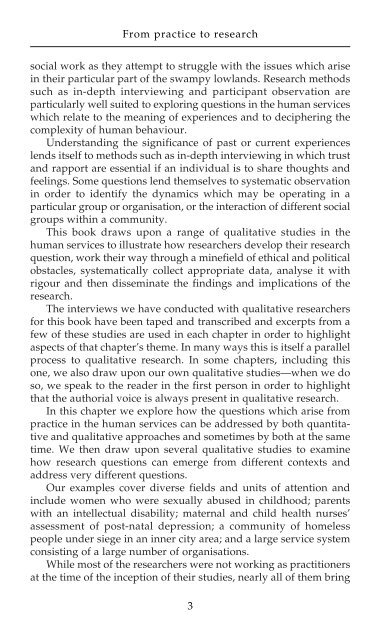Qualitative Research in Practice : Stories From the Field - Blogs Unpad
Qualitative Research in Practice : Stories From the Field - Blogs Unpad
Qualitative Research in Practice : Stories From the Field - Blogs Unpad
You also want an ePaper? Increase the reach of your titles
YUMPU automatically turns print PDFs into web optimized ePapers that Google loves.
<strong>From</strong> practice to research<br />
social work as <strong>the</strong>y attempt to struggle with <strong>the</strong> issues which arise<br />
<strong>in</strong> <strong>the</strong>ir particular part of <strong>the</strong> swampy lowlands. <strong>Research</strong> methods<br />
such as <strong>in</strong>-depth <strong>in</strong>terview<strong>in</strong>g and participant observation are<br />
particularly well suited to explor<strong>in</strong>g questions <strong>in</strong> <strong>the</strong> human services<br />
which relate to <strong>the</strong> mean<strong>in</strong>g of experiences and to decipher<strong>in</strong>g <strong>the</strong><br />
complexity of human behaviour.<br />
Understand<strong>in</strong>g <strong>the</strong> significance of past or current experiences<br />
lends itself to methods such as <strong>in</strong>-depth <strong>in</strong>terview<strong>in</strong>g <strong>in</strong> which trust<br />
and rapport are essential if an <strong>in</strong>dividual is to share thoughts and<br />
feel<strong>in</strong>gs. Some questions lend <strong>the</strong>mselves to systematic observation<br />
<strong>in</strong> order to identify <strong>the</strong> dynamics which may be operat<strong>in</strong>g <strong>in</strong> a<br />
particular group or organisation, or <strong>the</strong> <strong>in</strong>teraction of different social<br />
groups with<strong>in</strong> a community.<br />
This book draws upon a range of qualitative studies <strong>in</strong> <strong>the</strong><br />
human services to illustrate how researchers develop <strong>the</strong>ir research<br />
question, work <strong>the</strong>ir way through a m<strong>in</strong>efield of ethical and political<br />
obstacles, systematically collect appropriate data, analyse it with<br />
rigour and <strong>the</strong>n dissem<strong>in</strong>ate <strong>the</strong> f<strong>in</strong>d<strong>in</strong>gs and implications of <strong>the</strong><br />
research.<br />
The <strong>in</strong>terviews we have conducted with qualitative researchers<br />
for this book have been taped and transcribed and excerpts from a<br />
few of <strong>the</strong>se studies are used <strong>in</strong> each chapter <strong>in</strong> order to highlight<br />
aspects of that chapter’s <strong>the</strong>me. In many ways this is itself a parallel<br />
process to qualitative research. In some chapters, <strong>in</strong>clud<strong>in</strong>g this<br />
one, we also draw upon our own qualitative studies—when we do<br />
so, we speak to <strong>the</strong> reader <strong>in</strong> <strong>the</strong> first person <strong>in</strong> order to highlight<br />
that <strong>the</strong> authorial voice is always present <strong>in</strong> qualitative research.<br />
In this chapter we explore how <strong>the</strong> questions which arise from<br />
practice <strong>in</strong> <strong>the</strong> human services can be addressed by both quantitative<br />
and qualitative approaches and sometimes by both at <strong>the</strong> same<br />
time. We <strong>the</strong>n draw upon several qualitative studies to exam<strong>in</strong>e<br />
how research questions can emerge from different contexts and<br />
address very different questions.<br />
Our examples cover diverse fields and units of attention and<br />
<strong>in</strong>clude women who were sexually abused <strong>in</strong> childhood; parents<br />
with an <strong>in</strong>tellectual disability; maternal and child health nurses’<br />
assessment of post-natal depression; a community of homeless<br />
people under siege <strong>in</strong> an <strong>in</strong>ner city area; and a large service system<br />
consist<strong>in</strong>g of a large number of organisations.<br />
While most of <strong>the</strong> researchers were not work<strong>in</strong>g as practitioners<br />
at <strong>the</strong> time of <strong>the</strong> <strong>in</strong>ception of <strong>the</strong>ir studies, nearly all of <strong>the</strong>m br<strong>in</strong>g<br />
3

















